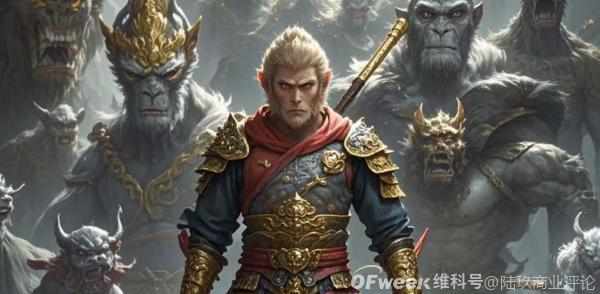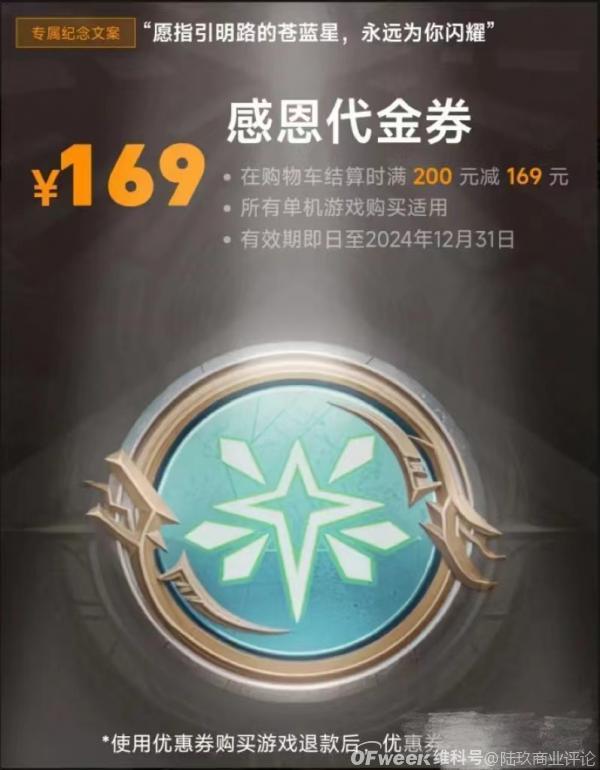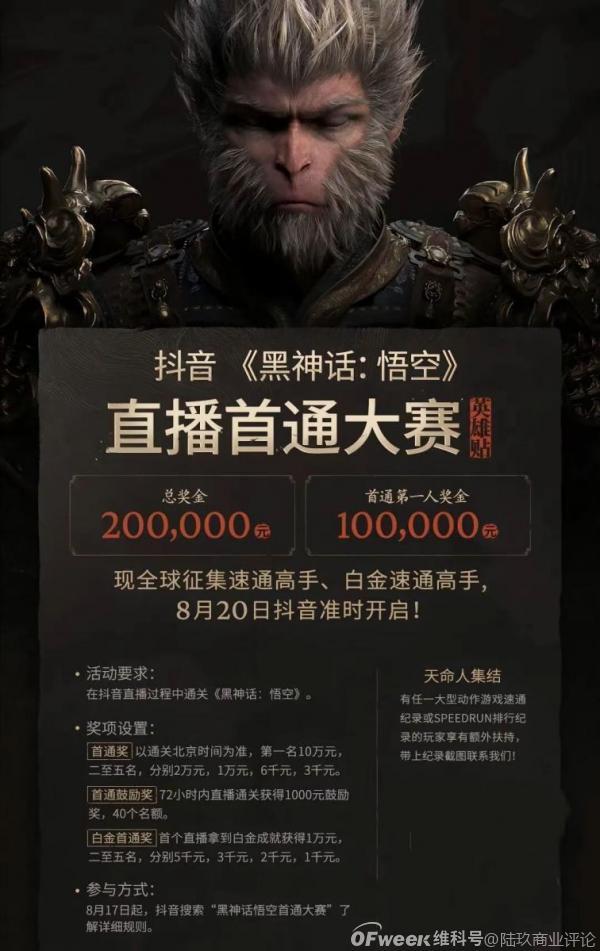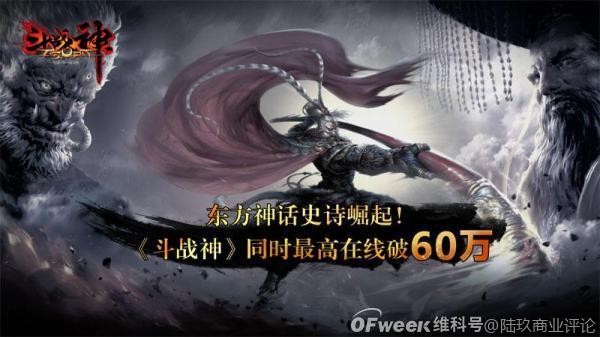"Black Myth: Wukong" Is Not a Straw to Save WeGame
![]() 08/23 2024
08/23 2024
![]() 654
654
In a sense, Tencent has done nothing wrong, but the takedown of "Monster Hunter: World" due to reports has undermined WeGame's credibility, thereby depriving it of the historical opportunity to become the leading domestic channel for domestic stand-alone games. This also foreshadows the current awkward situation of the Chinese version of "Black Myth: Wukong".

Three days after its release, "Black Myth: Wukong" has become a phenomenal game and a genuine "traffic magnet." Anything related to it quickly garners market attention and goes viral.
The A-share market's response was immediate. Apart from the gaming sector that had already rallied, Huayi Brothers' share price surged 70% in five trading days – despite only holding less than 1% of developer Youke Interactive through indirect investment.
Regarding peripheral content collaborations and licensing, prices have skyrocketed. According to a Game Science IP licensing example obtained by L9 Business Review, multiple collaborations related to Black Myth Wukong are priced around $300,000, an extremely exorbitant figure even by luxury industry standards.
Amidst this frenzy of traffic and commerce, Tencent, known for its strong gaming business, appears relatively "calm." Even Tencent's Hong Kong-listed shares seem unaffected.
"Black Myth" Takes Off, WeGame Stays Tepid
In fact, a month before "Black Myth" launched, WeGame held a summer sale, offering players coupons of varying amounts for game purchases. L9 Business Review found that discounts ranged from $3 to $9, with some lucky users drawing $25 coupons, but only valid for games over $30.

On WeGame, only a few games like "Black Myth" fit within this price range. This means Tencent effectively discounted the original $39 price to $15 (similar to "Gu Jian Qi Tan 3" a few years ago).
Despite these discounts, WeGame players' voices were relatively muted on social media as a publisher of "Black Myth."
Based on August 20th domestic game bestseller data, a gaming channel industry insider told L9 Business Review that out of an estimated 5 million sales across platforms, Steam accounts for over 3 million, PlayStation for 1 million, and Epic Games Store for another half million, leaving roughly 500,000 for WeGame – one-tenth of total sales.
Another indication is that most media and data platforms primarily track Steam sales. WeGame, with a similar user base, is rarely mentioned.
Compared to Steam, WeGame offers occasional large discounts (yes, even the $25 coupon is by chance) but has room for improvement in community building, review systems, and other soft features. Additionally, the WeGame version of "Black Myth" requires nearly 250GB of storage, almost double that of PS5 and Steam versions.
While this may not significantly impact most users, "Black Myth" requires additional time for decompression after downloading. On an SSD, this takes about half an hour but can stretch to 1-2 hours on an HDD.
The abnormal storage requirement degrades the experience for most HDD users, especially speedrunners competing for "world-first" completions, where a 1-2 hour difference can make or break the race. With substantial rewards for speedruns, the decompression time could cost challengers their prize.

According to a seasoned "Elden Ring" player with over 3,000 hours, "Black Myth" excels in graphics, utilizing state-of-the-art techniques like global illumination, water refraction, shadows, reflections, and secondary reflections, resulting in industry-leading visuals. "Elden Ring's ray tracing is a joke," they commented to L9 Business Review.
WeGame's Dark Moment
For similar reasons, most players prefer stable, reputable platforms. Despite being a distribution channel for "Black Myth," WeGame no longer seems to be most players' first choice due to past incidents.
Six years ago in 2018, WeGame's situation was different.
Back then, the 20-year-old "console ban" hadn't been fully lifted, and there were no official domestic distribution channels for stand-alone games. China's gaming industry focused on PC, web, and mobile games, lacking traditional AAA stand-alone titles, which represent a country's gaming industry's industrialization level.
Announcing WeGame as China's first stand-alone game platform garnered significant attention. As a platform under Tencent, China's top gaming giant, it had the resources to succeed.
Tencent has strategically invested in numerous overseas game companies and studios, from CAPCOM and PlatinumGames in Japan to Supercell and Ubisoft in Europe, prioritizing domestic distribution rights and IP mobile adaptations over shareholder or operational rights.
The domestic release of TGA Award-winning "Monster Hunter: World" on WeGame was an early example of this strategy.
On August 8, 2018, Tencent launched "Monster Hunter" on WeGame, only to announce its takedown five days later due to numerous reports, marking "the darkest day in Chinese gaming."
Tencent offered refunds or continued service to purchasers, but the game remained unchanged while other versions evolved, frustrating dedicated players.
Attempts to identify the "culprit" behind the takedown were unsuccessful, with Ding Lei initially responding. More details emerged, pointing to mass reports from unknown IP addresses.
While Tencent did nothing wrong, "Monster Hunter's" takedown undermined WeGame's credibility, indirectly affecting "Black Myth's" Chinese version.
Does Tencent "Need" Black Myth?
From a corporate perspective, today's Tencent likely lacks the conditions to nurture "Black Myth."
Crucially, "Black Myth's" core team, led by Yang Ji (lead designer) and Yang Qi (lead artist), previously worked on Tencent's "Fight Back to God" to rehabilitate the company's reputation amid negative publicity.

At launch, it achieved this: many free-to-play players could defeat bosses, with a 99.7% activation rate, 85%+ satisfaction, and nearly 50% daily logins in the first month. In its open beta in 2013, it peaked at 600,000 concurrent users, a record for MMO open betas in China at the time.
However, like other MMORPGs, "Fight Back to God" struggled with commercialization, class balance, and drop rates, gradually losing popularity and players.
As mobile gaming rose, Tencent shifted to the familiar "IP from PC to mobile" strategy, often compromising creativity for commercialization and monetization depth.
A former Tencent architect told L9 Business Review that game pitches typically include core gameplay in a demo with basic UI and graphics. However, in Tencent and many companies, most development costs go towards graphics, UI, and monetization depth – reasons why many Tencent games are visually appealing and deeply monetized but lack gameplay depth.
Even for less content-heavy mobile games, creating a decent app costs tens of millions. Trial-and-error costs have soared. Spending years and hundreds of millions on a project like "Black Myth" for a shot at virality is highly speculative.
Assuming 5 million sales on day one, "Black Myth" would gross roughly $380 million. Such sales would've been easily achievable for a phenomenal web or mobile game a decade ago. Thus, it's not "Black Myth's" greatness but its rarity that makes it stand out.
A company's greatest success is not meeting unrealistic external expectations but achieving its business and growth goals. Tencent has already invested in "Black Myth" and profited commercially; demanding a "phenomenal AAA title" would be unfair.







